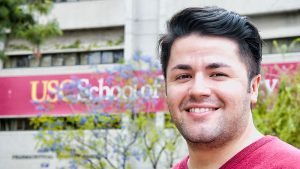
What prompted your interest in science? Do you recall any specific “lightbulb” moments where you knew this was the pursuit for you?
I don’t know if I ever had an “aha” moment, but my early inspirations drew from cartoons and comics. One of my favorite cartoon series was the X-Men, which sometimes involved space and time traveling superbeings. I would fantasize about the storylines and imagine the possibilities of actually travelling through space and time. It was fascinating and helped me escape the realities of growing up in a bad neighborhood.
As I grew older, my interest in comics and science-fiction didn’t wane; I started reading Jorge Luis Borges and found inspiring shorts like “The Garden of the Forking Paths.” This one in particular stuck with me because it was reminiscent of another thought-provoking TV series called “Sliders” that involved travelling through alternate worlds in search of their original. Each journey into a different reality potentially embraced different possibilities and could result in wild differences or even nearly indiscernible ones from their own world. It kept me thinking after the show because it was fascinating. As I would later learn, a lot of this (and Sci-Fi in general) is inspired by science and I think it was around then that I knew I had a future in it.
Why did you choose the USC School of Pharmacy?
One of the appealing factors that sold me was the famous USC alumni network, the focus on translational science at various levels, and the option to earn a masters in either regulatory science or drug development. Taken together I believe they contribute to making me more competitive in the job market after my PhD. I was also impressed by the faculty.
Although I was accepted to other programs and was offered competitive fellowships, it was a USC faculty member, Dr. Andrew MacKay, who took the time to schedule a phone conversation with me. It was a critical interaction that affected my decision-making process by convincing me the program would be a good fit. I was very impressed by him during the initial interview process and the call sealed the deal for me, so to speak.
What was your academic and career background, prior to coming to USC?
I worked in sales and retail management before attending college. After transferring out of community college, I received funding support through the MARC Scholars Program at Cal State Los Angeles under the guidance of Dr. Linda Tunstad where I studied total organic synthesis to earn my BS in Biochemistry.
I was also accepted into the Amgen Scholars Program at Stanford and conducted research under the supervision of Dr. Thomas Wandless in the Chemical and Systems Biology Department where I expanded my interest and skill toolset to include biological research.
This program was instrumental in helping me test myself at a different level and explore a new academic environment. It was an eye-opening experience that introduced me to biological research after working solely in a synthetic organic chemistry lab. It helped me narrow down the programs I wanted to apply to, but it was also a confidence building experience. Coming from a small school without a PhD program, there was always a question about whether I would thrive at a different level, but it wasn’t until finishing this program that I was a little more sure I could.
What is one of the best experiences you’ve had at the School of Pharmacy so far?
My best experience can’t be isolated to a single event. Rather, I think my best experience is better characterized by a process. One piece of advice that I was given before attending graduate school is that it will change me, whether I intend for it to happen or not. The change I’ve noticed since my start of the program is that process, and it has been a wholly positive experience. I am a better person and scientist as a result.
Could you tell us a bit about your work in Dr. Andrew MacKay’s lab?
I study elastin-like polypeptides (ELPs), which exhibit a reverse-phase transition characteristic at a threshold temperature, which we can visualize as particle formation when fused to a fluorescent reporter. ELPs are a tool that can be applied in drug delivery or studying cellular signaling as a molecular switch.
Why should prospective PhD students consider the USC School of Pharmacy?
Graduate school is about finding fit, so it is important that the aims of the school match your motivations. The USC School of Pharmacy is surrounded by a large medical community, so there is a strong focus on drug development and translation at various stages that range from basic to clinical. The program also offers a very generous support package that can stretch a long way. Having a wide range of food options nearby is also great, but there is also a ton of things to do during your free time. It is important that graduate students maintain a well-balanced lifestyle and living in Los Angeles makes that really easy.
What are your long-term goals and plans after your PhD? Where do you see yourself in 10 years?
My interests are evolving and it is difficult to imagine where I’ll be in 10 years. I’ve been eyeing a career in academia since almost the beginning but industry has been looking like a very appealing option lately. I think I can be happy in either environment as long as I get to conduct interesting science with a real impact. I want to keep my options open and narrow down as time goes on. I don’t want to miss potential opportunities by limiting myself to a specific possibility this early, but by the 10 year mark, I’d like to be a PI and help train PhD students (academia) or be an established scientist at a pharmaceutical company (industry).

